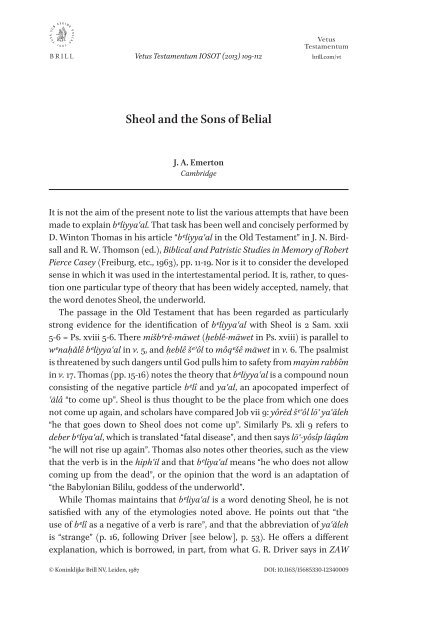Special Issue IOSOT 2013 - Books and Journals
Special Issue IOSOT 2013 - Books and Journals
Special Issue IOSOT 2013 - Books and Journals
You also want an ePaper? Increase the reach of your titles
YUMPU automatically turns print PDFs into web optimized ePapers that Google loves.
Vetus Testamentum <strong>IOSOT</strong> (<strong>2013</strong>) 109-112<br />
Vetus<br />
Testamentum<br />
brill.com/vt<br />
Sheol <strong>and</strong> the Sons of Belial<br />
J. A. Emerton<br />
Cambridge<br />
It is not the aim of the present note to list the various attempts that have been<br />
made to explain beliyyaʿal. That task has been well <strong>and</strong> concisely performed by<br />
D. Winton Thomas in his article “beliyyaʿal in the Old Testament” in J. N. Birdsall<br />
<strong>and</strong> R. W. Thomson (ed.), Biblical <strong>and</strong> Patristic Studies in Memory of Robert<br />
Pierce Casey (Freiburg, etc., 1963), pp. 11-19. Nor is it to consider the developed<br />
sense in which it was used in the intertestamental period. It is, rather, to question<br />
one particular type of theory that has been widely accepted, namely, that<br />
the word denotes Sheol, the underworld.<br />
The passage in the Old Testament that has been regarded as particularly<br />
strong evidence for the identification of beliyyaʿal with Sheol is 2 Sam. xxii<br />
5-6 = Ps. xviii 5-6. There mišberê-māwet (ḥeblê-māwet in Ps. xviii) is parallel to<br />
wenaḥălê beliyyaʿal in v. 5, <strong>and</strong> ḥeblê šeʾôl to môqešê māwet in v. 6. The psalmist<br />
is threatened by such dangers until God pulls him to safety from mayim rabbîm<br />
in v. 17. Thomas (pp. 15-16) notes the theory that beliyyaʿal is a compound noun<br />
consisting of the negative particle belî <strong>and</strong> yaʿal, an apocopated imperfect of<br />
ʿālâ “to come up”. Sheol is thus thought to be the place from which one does<br />
not come up again, <strong>and</strong> scholars have compared Job vii 9: yôrēd šeʾôl lōʾ yaʿăleh<br />
“he that goes down to Sheol does not come up”. Similarly Ps. xli 9 refers to<br />
deber beliyaʿal, which is translated “fatal disease”, <strong>and</strong> then says lōʾ-yôsîp lāqûm<br />
“he will not rise up again”. Thomas also notes other theories, such as the view<br />
that the verb is in the hiphʿil <strong>and</strong> that beliyaʿal means “he who does not allow<br />
coming up from the dead”, or the opinion that the word is an adaptation of<br />
“the Babylonian Bililu, goddess of the underworld”.<br />
While Thomas maintains that beliyaʿal is a word denoting Sheol, he is not<br />
satisfied with any of the etymologies noted above. He points out that “the<br />
use of belî as a negative of a verb is rare”, <strong>and</strong> that the abbreviation of yaʿăleh<br />
is “strange” (p. 16, following Driver [see below], p. 53). He offers a different<br />
explanation, which is borrowed, in part, from what G. R. Driver says in ZAW<br />
© Koninklijke Brill NV, Leiden, 1987 DOI: 10.1163/15685330-12340009








![Am HaSefer [Volk des Buches] - Books and Journals](https://img.yumpu.com/20648352/1/174x260/am-hasefer-volk-des-buches-books-and-journals.jpg?quality=85)







